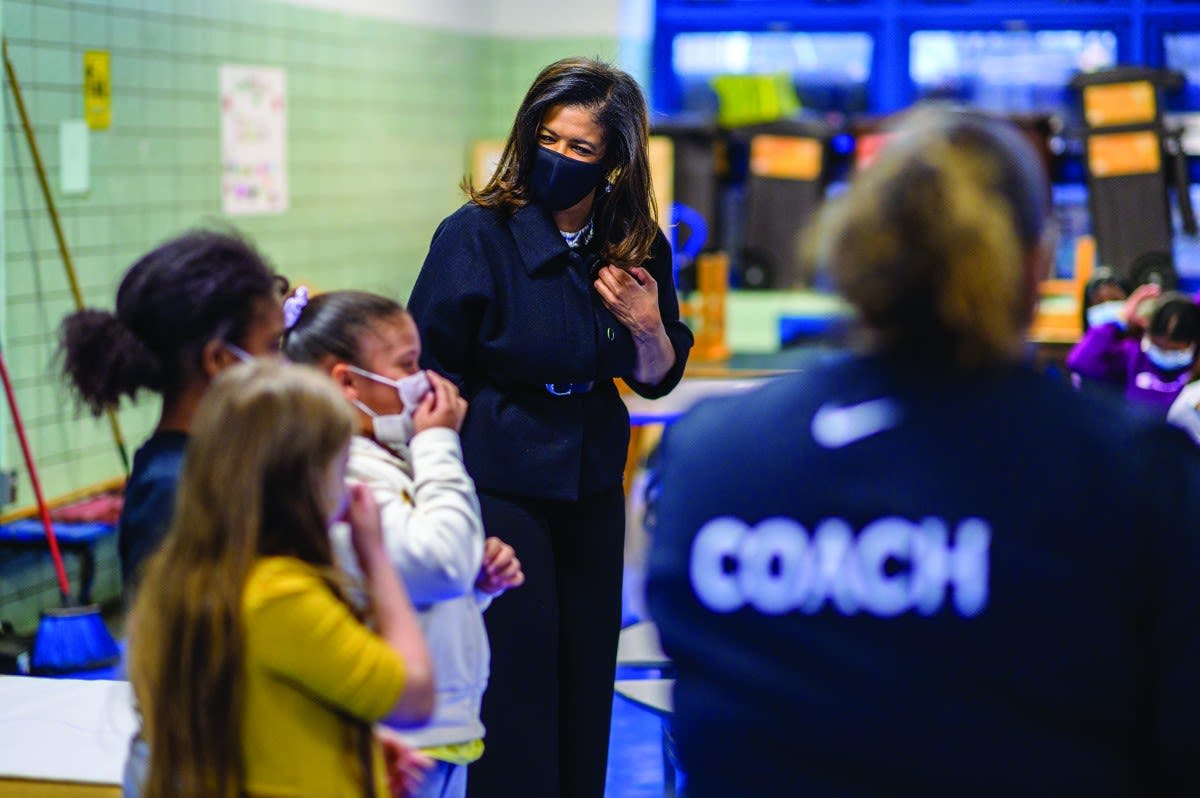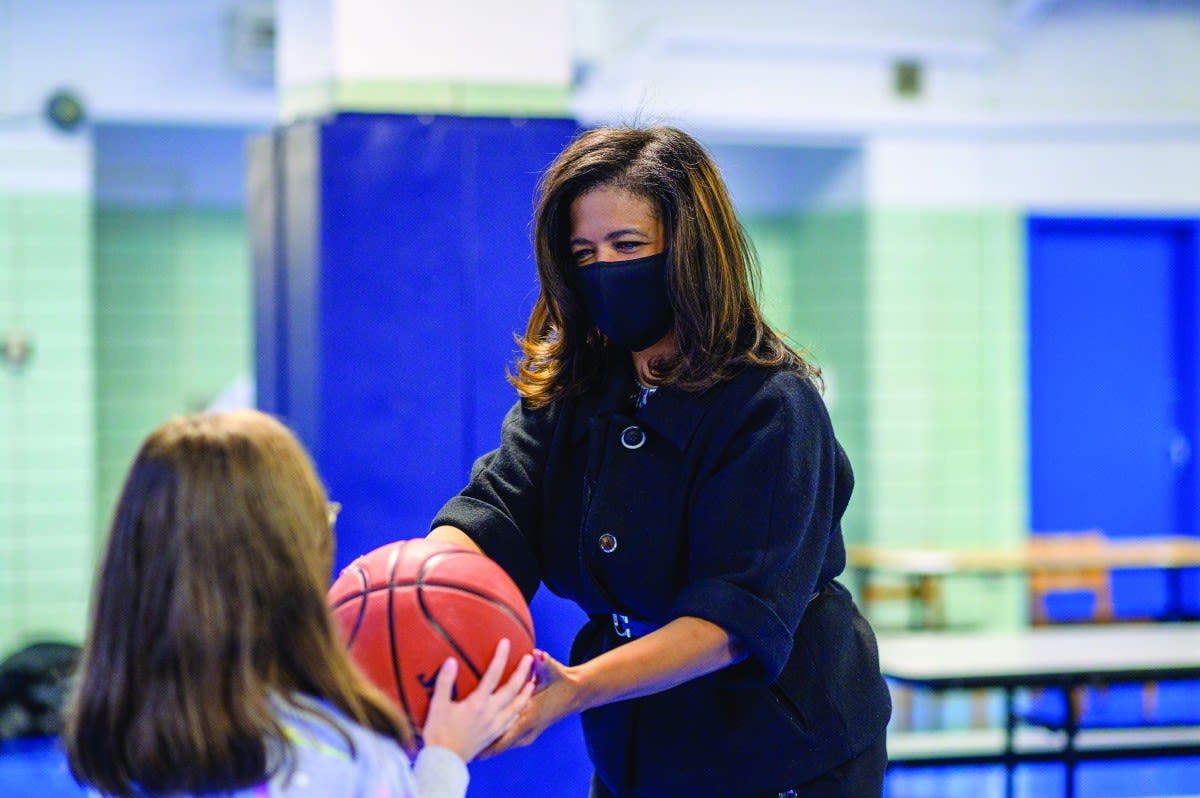Lifelong Service to Others Inspires Alumna in New Nonprofit Career
Serving others has been the fabric woven throughout the life of Nicole Mussenden ’88, starting back in the apartment she shared with her mother and sister in Harlem, New York. There, at age 7, she founded a bookstore.
Mussenden recognized early that she was fortunate — that her mother advocated to have her attend Hunter College Elementary School on Manhattan’s Upper East Side, where she flourished with a top-quality education and access to pretty much any book she could have wanted. She wanted to share the opportunities she had with other kids in her public housing complex. So, Mussenden began gathering books and created her own bookstore.
“I always thought that someone should have what you have, whether it’s books or anything else,” she says. She remembers combing through her closet for extra clothes, to share with her mother’s students who, her mother told her, needed them more.
Her mother saw opportunity through education, seizing a chance to attend Queens College for free and later earning two master’s degrees. An art teacher for 30 years in the New York City public schools, she served as a model for how her daughter would live her life.
“She saw it as service,” Mussenden says of her mother’s career. “She saw it as building up her students and serving them. And I grew up thinking the same way.
“So, I’ve always volunteered my time for afterschool programs or tutoring programs on Saturdays and created a tutoring program [for high school students] when I was at Stevens.”
After a highly successful career in sports marketing and sales, where she held top positions with Fox Networks and ESPN, Mussenden’s work has now shifted fully to service, specifically to girls and young women from low-income communities in New York City.
In June 2021, Mussenden became president and CEO of PowerPlay NYC, a nonprofit organization whose mission is to advance the lives of girls through sports.
Serving girls ages 8-18, the Manhattan-based organization offers sports-based afterschool programs for elementary and middle school girls and a leadership program for high school girls featuring monthly sports-based and leadership workshops, a mentoring program, a peer coaching program, college and career-readiness activities and college tours.
Currently, PowerPlay NYC has programs in all five boroughs of New York City, at some 20 school sites. At full strength, without the effects of COVID-19, PowerPlay NYC serves more than 1,800 girls annually. The vast majority of participants are from low-income communities, and about 90% are Black or Latina.
“They really focus on movement, physical fitness, mental health, emotional health — we try to take care of the whole girl because we know that sports offer so many things in life that can help you, such as confidence and team building, and resilience, fortitude and goal setting,” Mussenden says.
PowerPlay in Action
A large number of women in leadership roles in corporate America played sports, Mussenden says; she herself played multiple sports growing up and was on the women’s tennis and volleyball teams at Stevens.
PowerPlay NYC doesn’t care if you’re a superstar player. It’s all about getting out there and building confidence that is lifelong, she says. The girls of P.S. 111 in midtown Manhattan learn this immediately when Mussenden visits their school one afternoon this fall.
About 25 girls gather in the school’s cafeteria for the afterschool program, and Mussenden — elegant, with a great warmth — arrives pulling a cart. It is loaded with gifts — stylish white and purple PowerPlay NYC T-shirts for the girls and smart leggings for the two coaches who lead this group of lively elementary school girls. Mussenden instantly develops a rapport with the students and PowerPlay coaches, praising the coaches for their work and talking with the girls about sports and school. She shares a little bit of her own story. But mostly, she listens.
The coaches are as lively as their students, as they discuss their favorite healthy snacks — carrot sticks, broccoli — and their occasional splurges. Then, the girls split into pairs and are asked to describe one thing they admire about their partners, and themselves. They are given a mirror. Responses range from predictable —“I like your shirt. I like my hair.” — to heart-warming: “You have a great smile.”
When it’s time for basketball, the girls hustle around the cafeteria dribbling balls, passing, and Mussenden is right there with them. She demonstrates a nifty talent for twirling a basketball on the very tip of her finger.
She is incredibly busy leading a nonprofit that is trying to regain ground — and a greater reach across New York City — in the midst of a pandemic that has lasted for two years. With an office staff of six, she wears many hats and finds herself working well into the night, on weekends and in the early morning hours. Her devotion is full and apparent.
During a later Zoom call with The Stevens Indicator, she shares PowerPlay NYC’s email for “Giving Tuesday” — among the many national fundraising campaigns held on the Tuesday after Thanksgiving. The email includes a photo of a line of young fencers, all Black girls, in their uniform whites, swords raised in victory.
“Look at how strong they look,” she says. “There’s something so powerful about this image … so to me, this is it. This is what keeps me going.”
Service, Stevens and a Career Change
Volunteerism has always been a part of her life, and Mussenden has served as a math tutor with Harlem Village Academies’ Saturday program; as a career coach for women who are victims of domestic violence; as a youth leader at her church; and as a guest speaker at local high schools and colleges. At Stevens, despite a busy schedule as a civil engineering major and member of the women’s tennis and volleyball teams, she threw herself into service activities.
An alumna of the Stevens Technical Enrichment Program (STEP), she mentored and tutored incoming STEP freshmen and established a tutoring program, through her involvement with the National Society of Black Engineers (NSBE), for high school students. She remembers upperclassmen from Stevens’ Black Student Union guiding younger students like herself, offering valuable time management and leadership workshops. She herself was a natural leader, as president of Stevens’ NSBE chapter and serving on the NSBE’s regional board of directors as a student.
“I think that the best experience of my life was at Stevens,” Mussenden says. “Because it gave me a chance to grow and to develop into the person I am today. I can’t stress enough those extracurricular activities that helped shape me … and allowed me to develop leadership skills and become a well-rounded person.”
Her volunteerism would continue as she built a highly successful career. Starting out with National Grid in New York City, the utilities company where she supervised construction crews, she went on to earn an MBA from Northwestern University and embarked on a sales career based on her love of sports. She climbed the corporate sports ladder. Between her position at ESPN, where she was director of special markets, and later at Fox Networks, where she was director of affiliate sales and marketing, she negotiated more than 250 sports, entertainment and broadcast agreements and was responsible for hundreds of millions of dollars in annual revenue. The work was stressful and difficult, and she recalls flying six times during one week and questioning her choices.
“I felt like I wasn’t really being fulfilled,” she says. “I felt as if I wasn’t necessarily giving back.” One common thread through her corporate career was her mentoring of younger employees and her continued community work. This re-examination led to a new career as an adjunct professor with St. John’s University and LIM College in New York, where her love for working with young people was further ignited. Her close friend Perry LeBlanc, whom she met through Stevens’ STEP Program and who went on to graduate from Princeton University, then told her about the job at PowerPlay NYC.
Finding Her Inspiration
Her plans for PowerPlay NYC are many. She is trying to expand the program’s reach in schools across New York City. She hopes to build a learning and resource room at the organization’s Manhattan headquarters: a multi-faceted destination that would include computers and other technology, a library, a space to practice interviewing skills, a comfortable refuge where the high school girls would meet with their mentors and do homework. Fundraising — financial sponsors have included the NFL, Wells Fargo and the New York City Department of Education — is a top priority, of course. Her ultimate goal is to create a type of franchise model that could be adapted across the country.
As she has devoted herself to this organization, Mussenden has also confronted heartbreaking loss. Her mother Joy, a 22-year cancer survivor, died during the COVID-19 pandemic in 2020. Mussenden fights tears — then steadies herself — as she shares more memories of this remarkable woman.
After her successful career in education, her mother retired with great financial stability. But she still felt the need to give, whether it was to homeless people she met or the young girl in her church for whom a monthly MetroCard made all the difference, as she completed her college education.
“When I talk about service, it’s about being a good citizen, because that’s what it boils down to,” Mussenden says. “You want to help the world, you want to help your community, right? It all started with my mother.”
Nicole Mussenden, along with staff and girls from PowerPlay NYC, recently appeared on “Today with Hoda & Jenna” and “Good Day New York,” in celebration of International Women’s Day in March.




